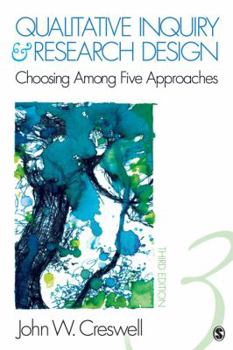Qualitative Inquiry & Research Design: Choosing Among Five Approaches
Select Format
Select Condition 
Book Overview
In this Third Edition of his bestselling text John W. Creswell explores the philosophical underpinnings, history, and key elements of each of five qualitative inquiry traditions: narrative research, phenomenology, grounded theory, ethnography, and case study. In his signature accessible writing style, the author relates research designs to each of the traditions of inquiry. He compares theoretical frameworks, ways to employ standards of quality, and strategies for writing introductions to studies, collecting data, analyzing data, writing a narrative, and verifying results.
Format:Paperback
Language:English
ISBN:1412995302
ISBN13:9781412995306
Release Date:March 2012
Publisher:Sage Publications, Inc
Length:472 Pages
Weight:1.43 lbs.
Dimensions:1.1" x 6.0" x 9.0"
Customer Reviews
5 ratings
basic foundation for beginning research students
Published by Thriftbooks.com User , 17 years ago
This book is helpful in explaining the different approaches to qualitative methods. The comparison charts in the book helps you to compare and contrast against the methods and helps in choosing a method to undertake your research study.
A very good introduction to qualitative methods
Published by Thriftbooks.com User , 18 years ago
Creswell's book effectively covers basic theoretical and practical issues regarding biographies, phenomenology, grounded theory, ethnography, and case studies. I studied this book as a graduate student and now use parts of it in my research methods class. He avoids much of the qualitative jargon that so many other qualitative writers can't seem to avoid, thus making this book accessible to students who are not familiar with qualitative approaches. I especially like the convenient tables that summarize key points and the real-life articles in the appendix, one for each approach. There is plenty of information about qualitative research that is not included in the book. For instance, having personally spent a great deal of time reading and applying phenomenology, I can honestly say that there is much more to this technique (theoretically and practically) than what is discussed in the book. For this reason I do not believe that people can conduct expert qualitative research after reading just Creswell - I am sure that he would agree. Other resources are needed. But everyone has to begin somewhere, and Creswell's book is an excellent start. I would like to see an expanded version of this book; one that discusses each qualitative tradition in greater detail. Dave After reading some of the example articles at the back of the book I am of the opinion that these articles are the weak spot for this book. In particular, the ethnography article is a very long and old paper (circa 1972?) about school principals that is more a case study than an ethnography. I think that Creswell could have selected a more recent paper that was a true ethnographic study. Also, the Grounded Theory paper on sexual victimization seems too depressing. The Phenomenological paper on the nurse-patient caring relationship is pretty good, however.
Excellent book
Published by Thriftbooks.com User , 19 years ago
Very well written, thorough, and easy to read. I think this is a must have for qualitative researchers. I have read three other qualitative research texts. This one goes beyond the other three and ought to be part of any qualitative researcher's library.
A must have for your qualitative research
Published by Thriftbooks.com User , 20 years ago
This is one of John Creswell's best books by far. I purchased it in paperback and actually had it spiral bound by a local print shop because I used it so much. I can't go on enough of how helpful this book was with one of my doctoral courses. I am glad our professor choose this text because when we went through various pieces of the five qualitative designs it gave great examples, detailed lists for guidance, and a great glossary. The studies in the text were very helpful as well. I recommend every masters and doctoral student to add it to their bookshelf, I guarantee you will use it a lot. It is invaluable!!!
This book delivers!
Published by Thriftbooks.com User , 22 years ago
Creswell manages to clearly explain differences and similarities of the five methods. Vocabulary, glossaries, examples and illustrations make each of the methodologies come alive to the reader. It is excellent as a review for someone who is writing their thesis, or for a new graduate student to grasp an understanding of qualitative methods. Creswell includes complete articles that illustrate the principles behind each of the methods. This is a "how to" and "what" book. It does not go into the philosophy behind each of the methods or the history of their development. For that perspective, try Denzin and Lincoln's Handbook of Qualitative Research. But when you are clearly defining a research project, it isn't philosophy that helps you! This book is a definite must for anyone interested in understanding or critiquing qualitative methods, or writing a qualitative proposal. Highly recommended!!!





